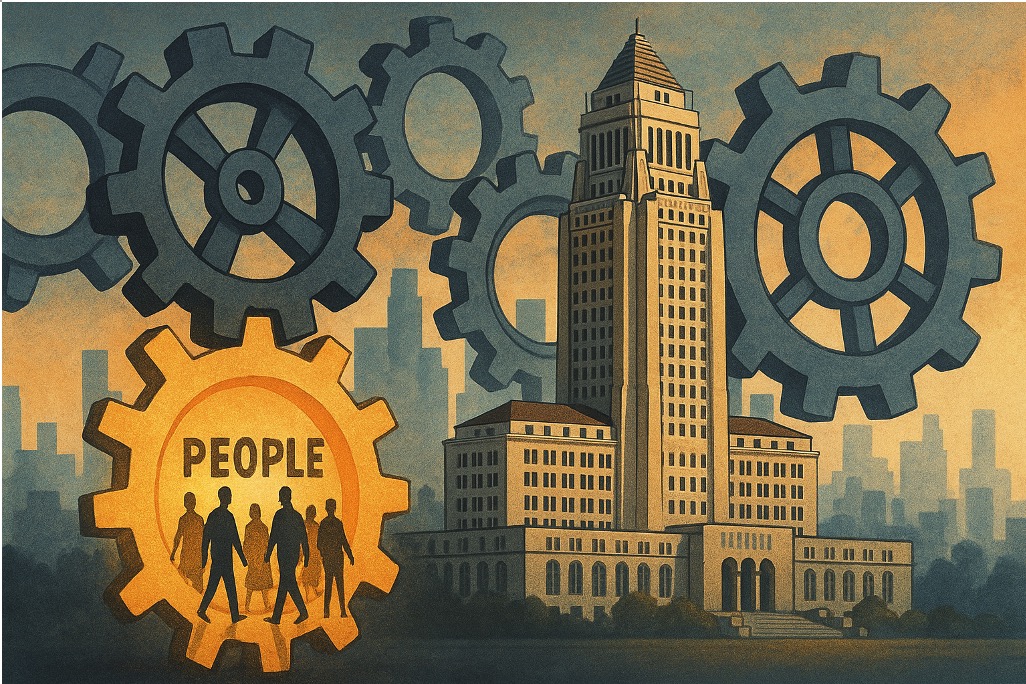A STUDENT’S P.O.V. – As a student watching the mayoral race unfold in Los Angeles, I’ve been struck by how many candidates — and their supporters — claim they can “fix” the city like it’s a broken machine. The latest example comes from “The Fixer Who Would Be Mayor,” a piece that romanticizes the idea of an engineer stepping in to rescue a city that politicians have supposedly broken.
It’s an appealing narrative: government is inefficient, politicians are self-serving, and only a pragmatic outsider can restore order. But while the frustration it taps into is very real, its solution is deeply misguided. Los Angeles is not broken because it lacks engineers. It’s struggling because it has lost its civic compass.
A City Is More Than a System to Repair
The piece argues that L.A.’s core problems are managerial — not moral or structural. That’s a comfortable way to avoid the harder truth: our challenges are human, layered, and interconnected. Homelessness, climate adaptation, public safety, and affordability can’t be reduced to “operational failures.” They are the consequences of decades of inequity, disinvestment, and political neglect.
Engineering can design systems — but it cannot rebuild trust, compassion, or civic will. Those are political tasks in the noblest sense of the word.
Populism in a Lab Coat
It’s easy to rail against consultants, bureaucrats, and politicians. But “The Fixer Who Would Be Mayor” takes that cynicism a step too far, implying that democracy itself is the problem — that elected leaders are the obstacle to competence. That’s a dangerous premise.
Yes, Los Angeles needs reform. But democracy is not a design flaw to be “engineered out.” It’s the only tool we have to make sure government remains accountable to its people — not to private contractors, not to corporate lobbyists, and not to self-styled saviors who think credentials can replace public consent.
The Myth of the Apolitical Savior
The article frames Asaad Alnajjar as “above politics” — a doer, not a talker. But that claim misunderstands what politics actually is. Every decision a mayor makes — where to invest, whom to hire, which neighborhoods to prioritize — is political. It reflects values, not just formulas.
Pretending otherwise turns leadership into a technical exercise rather than a moral responsibility. We don’t need mayors who see themselves as neutral mechanics. We need leaders with the courage to take moral stands — on homelessness, on housing justice, on equity, on climate resilience.
Competence Matters — But So Does Compassion
There’s truth in Alnajjar’s frustration. Los Angeles is too reliant on consultants. Too slow to fill vacancies. Too comfortable with mediocrity. But his proposed cure — a city run by engineering logic — risks stripping away the very humanity this city needs to heal.
Competence without compassion is still failure. A government that fills potholes but ignores people sleeping in them is not a success story.
Efficiency and empathy are not opposites — they are partners. You can streamline processes and still value people. You can demand accountability without silencing communities. You can manage better without reducing residents to data points.
The Real Work Ahead
What Los Angeles needs now isn’t a fixer. It’s a listener — someone who sees residents not as obstacles or inefficiencies but as partners in rebuilding a city that works.
We need to restore power to neighborhood councils, not just mention them. We need transparency in budgets, hiring, and development — and genuine accountability for results. And yes, we need engineers and experts — but they must work with the public, not over it.
The idea that Los Angeles can be rescued by one “competent” man with a blueprint is a comforting myth. But cities are not machines. They are collective promises. And those promises are renewed not by efficiency alone but by engagement, fairness, and courage.
Los Angeles doesn’t need another lecture in engineering. It needs leadership that remembers what cities are built for: not just function, but belonging.
(Shoshannah Kalaydjian is a Jewish student writer exploring education, identity, and the challenges facing today’s youth. She amplifies Jewish student voices and advocates for safer, more inclusive learning environments.)

